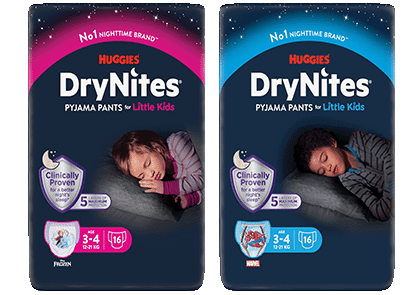
Get your free sample
What is ‘enuresis’?
Enuresis—referred to as ‘nocturnal enuresis’ if it only happens at night—is the medical term for bedwetting. There are two types of enuresis, and it’s fairly simple to know which one your child is dealing with:
Primary enuresis
If your child has always wet the bed, they are considered to have primary enuresis.
Secondary enuresis
If a child over the age of five has been dry for six months or more but then starts wetting the bed again, this is what is referred to as secondary enuresis.
How common is enuresis or bedwetting?
Don’t worry—bedwetting is very common and affects up to 15% of all 5-7-year-olds. As they get older, this is likely to decrease, with 2% of children at 15-years-old still likely to wet the bed at night.
Sometimes bedwetting is a constant, other times children who have been dry for months or years can start wetting the bed again seemingly out of the blue. This is referred to by doctors as ‘secondary enuresis’.
It’s also not unusual for bedwetting to start (or make an unwelcome comeback at puberty), with around one in 75 teenagers affected. One mum we spoke to thought her teenage son would wet his bed forever—but as with most kids, he just needed a little support and time to get through the phase.
What are the symptoms of enuresis?
Although there are some differences between helping support boys who wet the bed, and girls who wet the bed, generally the symptoms of enuresis are the same.
Your child may be showing signs of enuresis if they are...
- repeatedly wetting the bed
- wetting through their clothes
- wetting at least twice a week for around 3 months
However, every child is different, so if you’re at all concerned about your child wetting the bed, it’s worth speaking to your doctor. At the very least, they can provide their expert opinion and provide guidance if needed.
Is bedwetting a medical condition?
By itself, bedwetting or enuresis is not considered a medical condition. Instead, it’s best to consider bedwetting as a developmental stage. Eventually, your child will grow out of it, so in the meantime support is key.
How can you treat or manage enuresis?
Like many things, treating or managing enuresis depends on what may be causing their bedwetting. For some kids, stress and anxiety can cause bedwetting, while for others it’s just a part of their natural development.
NICE guidelines on bedwetting in under-19s suggest all children who wet the bed should be seen by a health professional from the age of five. Don’t be afraid to take a trip to the doctor as there are treatments available.
There are also charities you can turn to for help:
ERIC
ERIC is the Children’s Bowel & Bladder charity and offers resources for young children, teens and their families dealing with bedwetting issues.
Bladder & Bowel UK
Bladder & Bowel UK also offers resources to help your child with enuresis.
Bedwetting isn’t your child’s fault
Always remember your child is not being lazy or naughty by wetting the bed. With an understanding of the causes of bedwetting, and possible solutions, you’ll be able to support them without judgement.
For more information on bedwetting, explore our bedwetting advice—with advice from mums, dads and experts. Together, we’re here to support your child’s journey to drier nights.


 your parenting partner
your parenting partner



